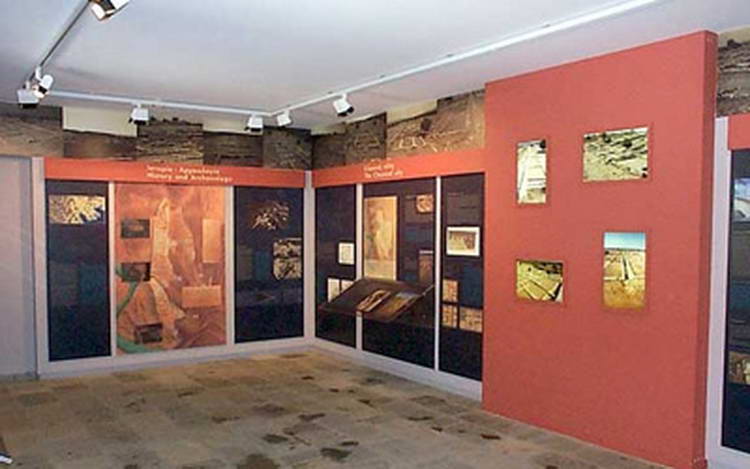Description
The museum opened in July 1998 in a building on the archaeological site of ancient Olynthos in Halkidiki.
The excavational finds are in the Poligiros Archaeological Museum. The Olynthos Museum has only audio-visual material, the purpose of which is to give visitors a complete picture of the archaeological site of Olynthos, starting with the history of the city and moving on to a description of the excavation and the restoration.
Visitors learn that the city was built to a Hippodamean plan (two wide avenues with insulae containing ten (square) houses, and a sewage pipe every five houses). An Olynthian house took the form of a pastas (a square, two-storey dwelling with rooms giving onto a covered inner courtyard) and was built of river stones and clay, with the superstructure being of unbaked bricks reinforced with a timber framework. In most of the houses, the floor was of compacted earth, but four have mosaic floors made with river pebbles and mortar.
Photographs and brief texts describe the domestic organisation (preparation of food, storage of foodstuffs, weaving) and the economic life of the city (stonework, koroplastics, agricultural activities, recreation, symposia).
Opening Hours:Tuesday-Sunday: 8.00-14.30
Monday closed
Admission: General: 2 Euro
Children & senior citizens: 0.50 Euro
The excavational finds are in the Poligiros Archaeological Museum. The Olynthos Museum has only audio-visual material, the purpose of which is to give visitors a complete picture of the archaeological site of Olynthos, starting with the history of the city and moving on to a description of the excavation and the restoration.
Visitors learn that the city was built to a Hippodamean plan (two wide avenues with insulae containing ten (square) houses, and a sewage pipe every five houses). An Olynthian house took the form of a pastas (a square, two-storey dwelling with rooms giving onto a covered inner courtyard) and was built of river stones and clay, with the superstructure being of unbaked bricks reinforced with a timber framework. In most of the houses, the floor was of compacted earth, but four have mosaic floors made with river pebbles and mortar.
Photographs and brief texts describe the domestic organisation (preparation of food, storage of foodstuffs, weaving) and the economic life of the city (stonework, koroplastics, agricultural activities, recreation, symposia).
Opening Hours:Tuesday-Sunday: 8.00-14.30
Monday closed
Admission: General: 2 Euro
Children & senior citizens: 0.50 Euro
Published: 1 Jun. 2010
Add to favorite
- Information -
| (+30)-2373-091-000 |
| www.macedonian-heritage.gr |
| GPS Coordinates |
| 40.286738 , 23.343279 |
| 40° 17' 12,2568"N , 23° 20' 35,8044"E |
Where to stay
accommodations located nearby
More Holiday Ideas
what else you can see here around
